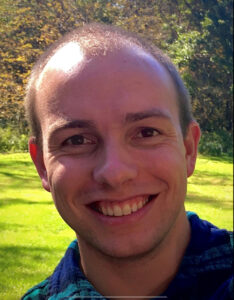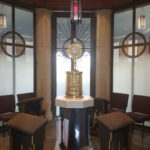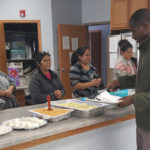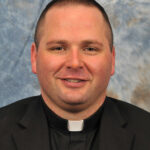By Patrick Schmadeke
We hear more when we slow down: birds calling, wind chimes making their music, a weathervane creaking, an air conditioner humming and vehicles stirring up rocks upon the gravel road. We see more when we slow down: the evening breeze willing the leaves to dance, the cirrus clouds brushed delicately upon the high skies, the spectrum of blues at dusk giving way to the star-glittered night sky.

To “see,” to “hear,” these aural and ocular metaphors amount to noticing, being attentive to one’s experience. This is basic to being human. Awe and wonder arise and provoke momentum in us and we are moved by it.
Launched last October, the diocesan phase of the Synod is now complete. The content of what we learned is summarized in the diocesan synod report. A golden thread of our learning is the complexity of listening. At first, listening may have appeared to be a simple, even mundane task. Listening is not the pure reception of data and people’s experience of the Church is not limited to the level of logic. We are talking about people’s experience of religion. It’s complicated, even sacred.
We discovered not only that understanding someone’s experience is a challenge. We discovered something more challenging: we ourselves are at stake when we listen. When we asked what breaks and fills people’s hearts about their experience of the Church, we don’t get to just listen. In the act of listening, we have to own what we’ve heard.
In service projects it is common to discover that the one who serves is changed more than the one being served. Think of a high school service trip — almost inevitably, the experience transforms those who participate and invest in the experience. The same is true of synodal listening.
The consequences of hearing are personal change, which is not merely directional change in a moment; there is a residual nature to the change — like ripples in a pond. To hear what brings someone sorrow, to hear what gives someone elation, to hear what gives someone knowledge of salvation, to see in someone’s eyes the awareness that God loves them — these are gifts that change the listener.
Jesus lived in such a way that he showed us what love looks like. Love looks like giving one’s life away at the service of those we meet. We have to let go of what we planned to do in order to discover what we ought to do; we have to die to what we thought was important to discover what is actually important. The dying and rising is daily and deliberate. It is also uncontrollable and always somehow, like the scent of honeydew in the wind; it arrives with surprise followed by peace and joy.
We’ve been doing lots of listening. Now what? In the Catholic tradition, many sequences of terms describe this: see — judge — act; encounter — listen — discern; experience — understand — judge — decide. They all seem to hint at the same basic phenomena, a movement from listening to action. This is a dynamic state: one does not suddenly stop listening; the listening is ongoing. At the same time, we are preparing for movement.
The people of the diocese have given us a gift in sharing their experience of the Church. We can’t be anything but moved by this. The world has changed in remarkable ways in the last few years. We’ve also been doing a lot of listening over the last few years: the Vision 20/20 listening sessions, Rediscovering Sunday survey and Synod on Synodality listening sessions. This has all been the work of establishing a foundation. It has taken time. We have learned along the way. We will continue to listen as we discern and plan to respond concretely to what people have shared. What happens when we slow down and listen? We prepare ourselves for action.
(Patrick Schmadeke is Director of Evangelization for the Diocese of Davenport.)











